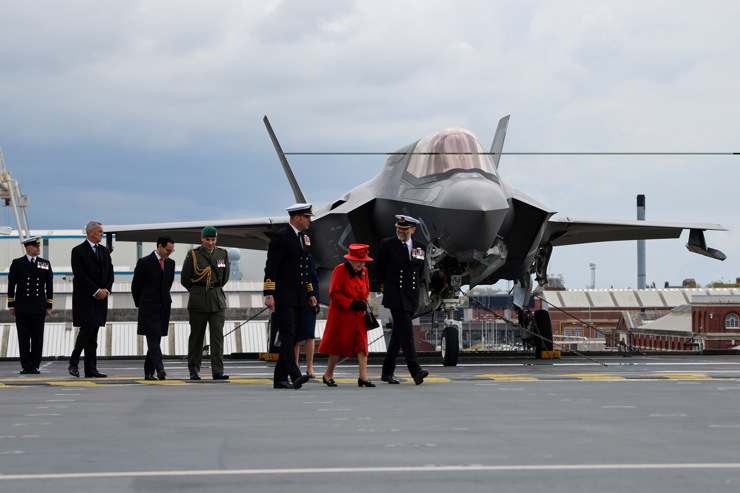The contested Indo-Pacific region is about to get a new entrant – the United Kingdom. On Saturday, Queen Elizabeth accorded a royal send off to the UK's state-of-the-art aircraft carrier, the HMS Queen Elizabeth, which set sail for the region beset with maritime and security tensions.
The queen visited the aircraft carrier and met the military personnel before the send off from the Portsmouth naval base. British Prime Minister too had spent the morning on board the carrier, which will soon lead an American and a Dutch military vessel on the voyage.
The aircraft carrier group will lead two destroyers, two frigates, a submarine and two support ships as it undertakes a seven-month voyage visiting 40 countries through the Mediterranean and the Indian Ocean into the Pacific. Besides its own aircraft, it will also carry American jets.
We were honoured with a very special send off:
Her Majesty The Queen was briefed on our plan by Commodore Moorhouse – and met the sailors, marines and aviators who will make it happen on her behalf.@smrmoorhouse #CarrierStrike pic.twitter.com/5bCv3YX4kl
— HMS Queen Elizabeth🇬🇧 (@HMSQNLZ) May 22, 2021
A new British policy towards Asia
British Prime Minister Boris Johnson had earlier said that this action will help the UK reinforce beliefs like democracy and the rule of law. The maritime deployment will also serve to send a signal to China against its assertiveness in the South China Sea. The idea behind sailing the flotilla is to assert the right to freedom of navigation in international seas.
The UK had in March overhauled its foreign and defence policy owing to the enormous shift in global politics. Under the new policy, the British government will have added focus in terms of economy, diplomacy and security in Asia for the coming decade. The British have followed many European nations – France, the Netherlands and Germany, who had last year recalibrated their policies towards Asia, keeping in mind a belligerent China.
Not just a military mission
The UK also is on a mission to reset its ties after departure from the European Union (EU). The flotilla is not just showcasing Britain's military might. It is equally about strengthening diplomatic relations with like-minded countries, forging closer ties with allies and holding military exercises.
The route of the warship will be the Mediterranean Sea, the Suez Canal, the Red Sea, the Arabian Sea, the Indian Ocean, the Malacca Strait, South China Sea, sailing past east China and the Philippines Sea. It will hold 70 engagements with 40 countries and make four big stops at India, Singapore, South Korea and Japan.
Quad countries complete the route
Besides India, the HMS Queen Elizabeth will also conduct military exercises with Japan, Australia and the US. This would also mean that the UK would have interacted with the four-member grouping – the Quad, separately even if not together. Beijing views the Quad with much suspicion and the British deployment is going to rub the Communist country the wrong way.
A recent statement from the British High Commission in Delhi said the carrier strike group “will engage in several joint exercises with the Indian military in the Indian Ocean aiming to broaden the scale of our interoperability and enhancing our capabilities to defend against shared threats and protect our democratic values.”
UK policy on China
Despite a global change in the mood towards China owing to its aggressive threats to Taiwan and Japan, the use of its military might in the South China Sea and against neighbours, the UK has been prevaricating in framing a clear foreign policy towards China. The decision to send the warship is perhaps the first signal that London is finally clearing the cobwebs from its China policy.
However, many in London see the deployment as being provocative towards Beijing and not everyone is in agreement with the decision to send so much force on such a long voyage.
The BBC has quoted Lord Nicholas Houghton as saying that: "it was not necessarily the best way of seeking an accommodation" with Beijing. The article also quotes Lord David Richards as saying that the UK should be focusing its attention closer home "on NATO and the Euro-Atlantic area".
However, British Defence Secretary Ben Wallace has said the deployment "will be flying the flag for Global Britain—projecting our influence, signalling our power, engaging with our friends and reaffirming our commitment to addressing the security challenges of today and tomorrow."




















